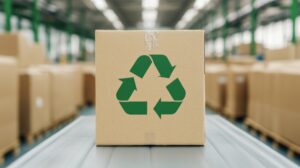Businesses placing packaged goods on the French market face increasing obligations under France’s packaging regulations. With Expanded Producer Responsibility (EPR) requirements and new 2025 amendments, companies must take action to stay compliant and maintain market access.
If your business manufactures, imports, or sells packaged products in France, you may need to register with a Producer Responsibility Organization (PRO), pay eco-contributions, and report packaging volumes—or risk fines and sales restrictions.
This guide breaks down who is impacted by France’s packaging laws, what’s required, upcoming regulatory changes, compliance deadlines, and penalties for non-compliance.
Who is Impacted by France’s Packaging Regulations?
A broad range of businesses must comply with France’s EPR requirements. The entities affected include:
- Manufacturers: Companies producing packaged goods within France.
- Importers: Businesses bringing packaged products into the French market.
- Distributors and Retailers: Including e-commerce platforms selling to French consumers.
The regulations cover various packaging materials for industrial, commercial, and household use such as plastics, paper/cardboard, glass, metals, composites, and wood.
What Are Businesses Required to Do?
To comply with France’s packaging regulations, businesses must undertake the following key actions:
1. Register with a Producer Responsibility Organization (PRO)
Before placing packaged products on the French market, companies are required to register with an approved PRO. These organizations manage the collection, sorting, and recycling of packaging waste on behalf of producers. Registration applies to all businesses, including those without a legal entity in France. In such cases, companies must designate an authorized representative within the country to handle compliance obligations.
2. Participate in Recycling Schemes
Businesses must contribute to the financing of packaging waste management by paying eco-contributions to their chosen PRO. The fees are determined based on the type and quantity of packaging materials placed on the market. France employs a system of modulated fees, incentivizing environmentally friendly packaging designs. Packaging that is easily recyclable or incorporates recycled materials may incur lower fees, while less sustainable options could attract higher costs.
3. Report Packaging Data
Companies are obligated to regularly report the volumes and types of packaging they place on the French market to their PRO. Accurate reporting ensures that the appropriate fees are applied and that recycling targets can be effectively monitored. If precise data is unavailable, businesses may use estimates based on product specifications, supplier information, or industry benchmarks.
Risks of Non-Compliance
Businesses that fail to comply with France’s packaging regulations may face significant penalties, including:
- Fines of up to €100,000 per violation, depending on the severity and nature of the non-compliance.
- Sales bans, preventing the company from selling products in France.
- Legal action, as competitors or consumer protection agencies may initiate proceedings against non-compliant businesses.
Additionally, businesses that fail to register with a PRO or do not fulfill their EPR obligations may be subject to increased scrutiny and enforcement actions by French authorities.
2025 Amendments to France’s Packaging Regulations
This year, France is introducing significant amendments to its packaging regulations, reinforcing its commitment to environmental sustainability and aligning with broader European Union objectives. Key updates include:
1. Inclusion of Industrial and Commercial Packaging under EPR
As of January 1, 2025, industrial and commercial packaging became subject to EPR obligations. This expansion brought previously excluded packaging into the recycling process, promoting a more comprehensive approach to waste management.
2. Reduction Targets for Single-Use Plastic Packaging
By 2025, France aims to achieve a 20% reduction in single-use plastic packaging, with at least half of this reduction coming from reusable or recyclable solutions. This initiative is part of a broader strategy to phase out single-use plastics by 2040, with interim targets set across multiple phases.
3. Implementation of the European Union’s Packaging and Packaging Waste Regulation (PPWR)
The European Union’s PPWR, which replaces the Packaging & Packaging Waste Directive (PPWD), published on January 22, 2025, entered into force on February 11, 2025. While the regulation applies directly across all EU member states, including France, its provisions won’t actually become applicable until August 12, 2026. The PPWR introduces several key measures that will gradually impact France’s packaging regulations:
- Recyclability Requirements: Packaging must be designed to be recyclable, with specific criteria to be defined by the European Commission by January 1, 2028.
- Recycled Content Targets: The regulation sets targets for recycled content in packaging materials, aiming to increase the use of recycled materials in packaging production.
- Waste Reduction Goals: Binding targets are established to reduce packaging waste, including measures to minimize unnecessary packaging and promote reusable packaging solutions.
By proactively ensuring compliance, businesses can avoid penalties, maintain market access, and contribute to a more sustainable packaging system in France.
Looking Ahead
France is continuously strengthening its packaging regulations to align with EU sustainability goals and drive waste reduction. Future updates may introduce stricter reporting obligations, expanded EPR requirements, and increased enforcement for online marketplaces and international sellers. To stay compliant, businesses should regularly monitor updates from ADEME and their chosen Producer Responsibility Organization (PRO).
Need Help with French Packaging Compliance?
Navigating France’s evolving packaging regulations can be challenging. At Tetra Tech, we have extensive experience helping businesses comply with European EPR requirements. From registration and reporting to PRO selection and fee optimization, our experts provide tailored solutions to keep your business compliant and competitive.
Contact our team today at [email protected] to simplify compliance and protect your market access.
This is the second installment in our blog series on packaging regulations across key EU member states. For detailed insights into other countries’ requirements, explore the articles linked below.
Part 1 (Germany): German Packaging Act (VerpackG): A 2025 Guide to International Packaging Laws (Part 1)
Part 2 (France): France Packaging Regulations: A 2025 Guide to International Packaging Laws (Part 2)
Part 3 (Italy): Italy’s Packaging Regulations: A 2025 Guide to International Packaging Laws (Part 3)
Part 4 (Ireland): Ireland’s Packaging Regulations: A 2025 Guide to International Packaging Laws (Part 4)
Part 5 (The Netherlands): The Netherlands Packaging Management Decree: A 2025 Guide to International Packaging Laws (Part 5)
Part 6 (Belgium): Belgian Packaging Regulations: A 2025 Guide to International Packaging Laws (Part 6)






